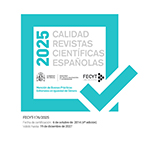Una radiografía del abandono escolar temprano en España: Algunas claves para la política educativa en los inicios del siglo XXI
Resumen
El abandono escolar temprano es una de las principales preocupaciones educativas y sociales en nuestro país, que presenta la tasa más elevada de la Unión Europea. No obstante, el retraso en los niveles de escolarización de España respecto al entorno europeo ha sido una constante histórica, que hunde sus raíces en un elenco de factores sociales y económicos. En este sentido, el presente trabajo tiene el objetivo de estudiar la evolución del abandono escolar temprano, contextualizando este fenómeno en los problemas de escolarización que históricamente ha presentado España, y poniendo especial énfasis en la evolución de este problema durante la primera quincena del siglo XXI.
Utilizando la información contenida en el indicador elaborado por la Encuesta de Población Activa, se han identificado ciertos patrones sociodemográficos que han marcado la evolución reciente del mismo, y que permiten obtener algunas claves que pueden ser útiles para comprender el fenómeno y orientar la política para luchar contra este problema de capital importancia. Los resultados sugieren que el mercado laboral ha jugado un papel importante en la evolución del indicador, mientras que la nacionalidad y la influencia del nivel de estudios de la madre son dos variables importantes que están en la línea del consenso existente en la literatura.
Descargas
Descarga artículo
Licencia
La Revista Complutense de Educación, para fomentar el intercambio global del conocimiento, facilita el acceso sin restricciones a sus contenidos desde el momento de su publicación en la presente edición electrónica, y por eso es una revista de acceso abierto. Los originales publicados en esta revista son propiedad de la Universidad Complutense de Madrid y es obligatorio citar su procedencia en cualquier reproducción total o parcial. Todos los contenidos se distribuyen bajo una licencia de uso y distribución Creative Commons Reconocimiento 4.0 (CC BY 4.0). Esta circunstancia ha de hacerse constar expresamente de esta forma cuando sea necesario. Puede consultar la versión informativa y el texto legal de la licencia.











